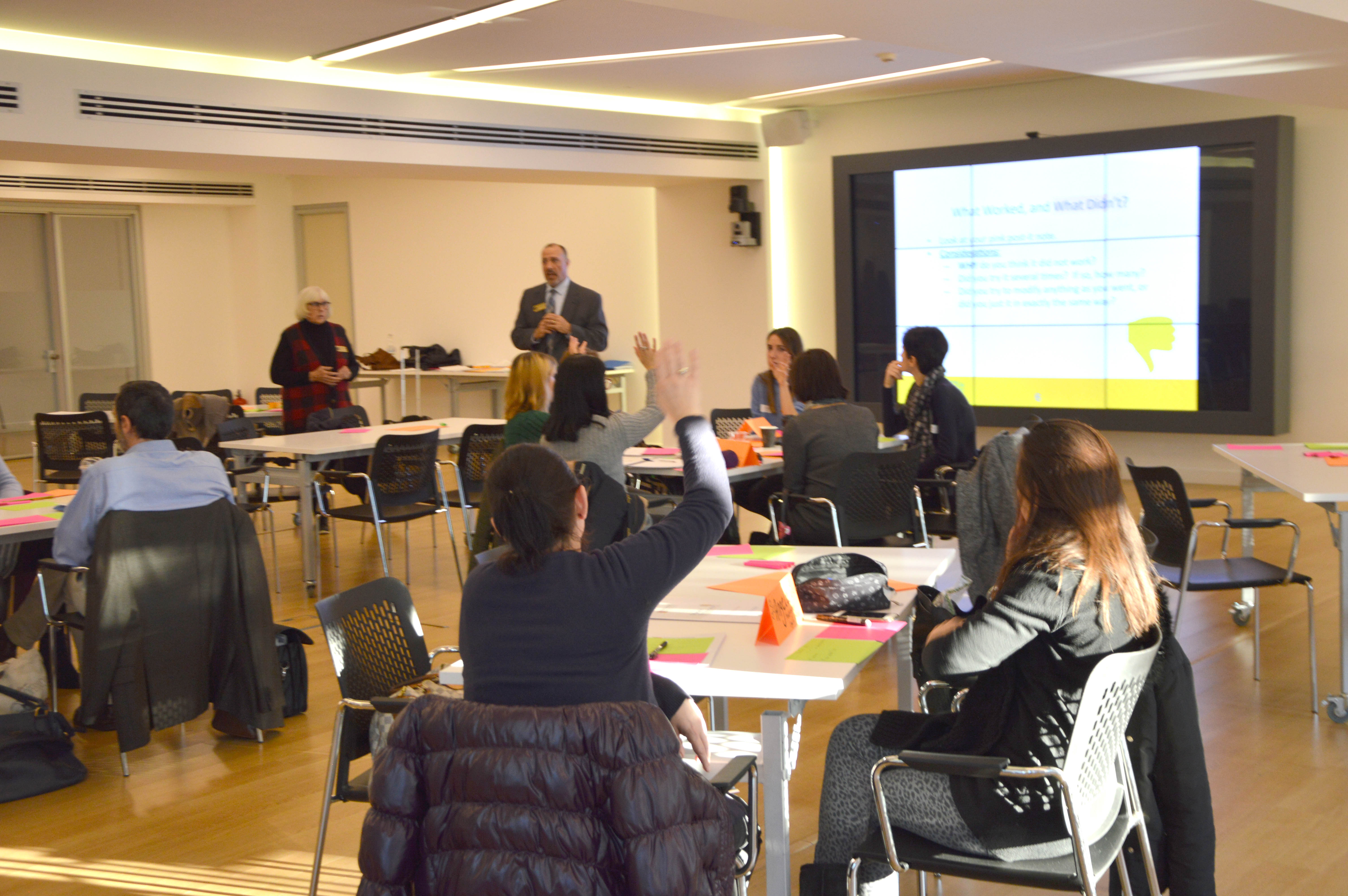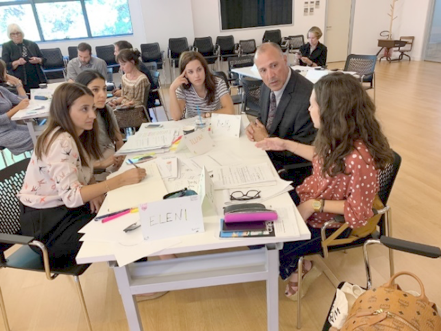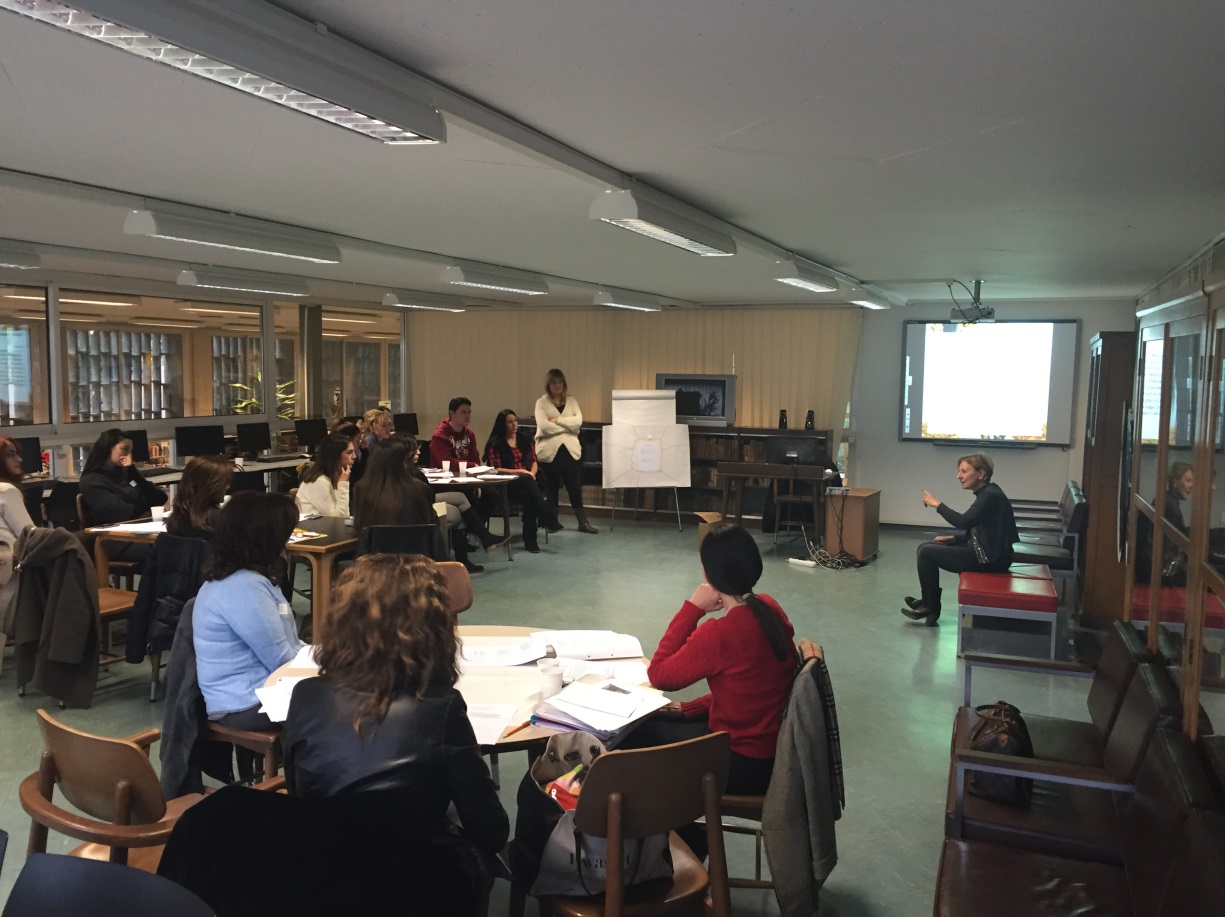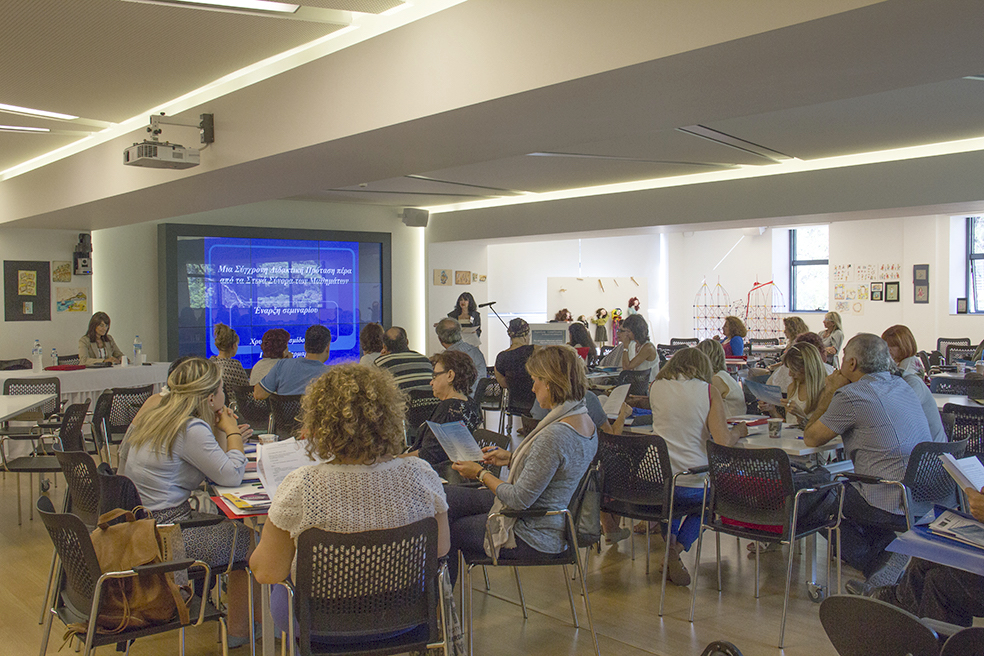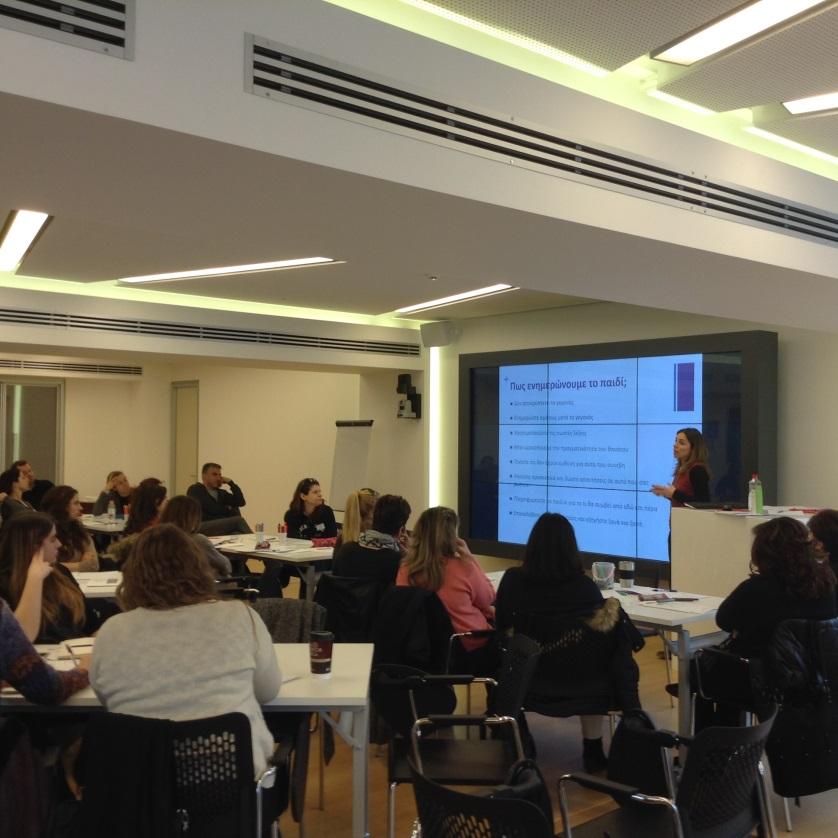Educate the Educators
For all newly hired faculty members who are in their first year of teaching at the College. The program consists of 3 modules that include:
- Introduction to the history, pedagogical philosophy, institutions and operation of our School. It is offered at the beginning of the academic year.
- Pedagogical Principles – didactic practices (lesson planning and organization, classroom management, assessment, development of pedagogical skills, characteristics of a good teacher). 20-hour seminar series.
For academic year 2023-2024, the first part of the seminar (10 hours), held on November 3-4, 2023, was titled:
Creating a Successful Classroom Through Better Relationships, Planning, Instruction, and Supportive Environment
(Building Positive Student/Parent Relationships, Quality Lesson Planning and Instruction, Personalizing Educational Experiences, Understanding Proactive Classroom Management Strategies)
The second part of the seminar, held on January 26-27, 2024, was titled:
Creating a Supportive Culture of Learning Through Rigor, Relevance and Relationships
(Understanding the Six Phases of Learning and Differentiation of Instruction, How to Build Relationships with a Trauma-Informed Lens, Personalizing Educational Experiences, Understanding How to Establish a Positive Classroom Culture.
Lecturers:
- Dr. Le Roy Whitehead, Educational Leadership Specialist
- Dr. Ann Little, Educational Leadership Specialist
- Michele Savage, Educational Leadership Specialist
The courses
were practical and experiential and gave the new teachers the opportunity to
become familiar with lesson planning and classroom management and effective
techniques for building respect and trust in the classroom and at school.
The Pedagogical Training Program (PTP or ΠΠΚ) is offered by Athens College to all its faculty members free of charge In order to complement their university studies and pedagogical training and to give them an opportunity to exercise guided reflection on their teaching practices.
It is primarily addressed to new teachers. However, more experienced teachers who want to refresh their knowledge and training are not excluded.
Duration: The program will begin in November 2021 and will conclude in June 2023. The total duration of the program is 150 hours over the course of two years.
Teachers can attend either Cycle I or Cycle II individually or they can attend both.
Certificate of Attendance: Participants who attend both cycles will receive a Certificate of Attendance for the entire Pedagogical Training Program. Those who attend one of the two cycles or any of the parts therein will receive a Certificate of Attendance for the specific cycle/seminar which they attend.
CONTENT
CYCLE I (2021-22)
- Lesson Planning, Classroom Management (25 lecture hours + 5 hours in-classroom practice/application).
Lecturers:
Dr. Vasiliki Demertzi – Giannakopoulou, Philologist, Didactics of philological subjects, Emeritus School Counselor
Dr. Agathi Georgiadou, Philologist, Emeritus School Counselor
Dr. Dimitris Kalaitzidis, Educational Project Coordinator at the 4th Attica Regional Centre for Educational Planning (PEKES)
- Mentoring/Coaching, Theory and Practice (10 lecture hours + 20 hours practice/application (in-class peer observation by pairs of teachers) + plenary session presentations.
Lecturer:
Dr. Sara Bubb (in English).
- One online course either from Harvard Graduate School of Education - Zero Project series - Teaching for Understanding or from the International Baccalaureate Organization (MYP, PYP, IBDP) + practice/application in the classroom.
CYCLE II (2022-23)
- Teaching Subject Area Courses, offered to groups of teachers who teach courses in the same/connected subject area (Greek Language, Mathematics, etc., determined by the specialties of the participants) (25 teaching hours + 5 hours of in-class practice/application).
Lecturers:
Prof. Dimitrios Koliopoulos, Didactics of Natural Sciences, University of Patras
Dr. Vasiliki Demertzi – Giannakopoulou, Philologist, Didactics of philological subjects, Emeritus School Counselor
Dr. Agathi Georgiadou, Philologist, Emeritus School Counselor
Despina Potari, Professor of Didactics of Mathematics, National and Kapodistrian University of Athens
Dr. Stelios Markantonakis, School Counselor of French Language, Educational Project Coordinator
Dr. George Bagakis, Professor Emeritus of the University of the Peloponnese, Documented Initiatives to Improve the Teaching of Different Specialties using Class Data - Work
- E-learning: Principles and Best Practices Design (10 teaching hours + 5 hours of in-class practice/application).
Lecturer:
Prof. Athanassios Jimoyiannis, Department of Social and Educational Policy, University of the Peloponnese
- Special Education (15 teaching hours + 5 hours of in-class practice/application).
Lecturer:
Anastasia Vlachou, Professor of "Special Education - Integration", Pedagogical Department of Special Education, University of Thessaly.
Within the framework of the continuous training/development of teachers, the Hellenic-American Educational Foundation (Athens College-Psychico College), offers, for a twelfth year, the “Teachers Training Teachers” program, a series of practical courses (2-6 teaching hours) directly linkable to the educational process.
These courses are addressed to the faculty of Athens College - Psychico College (on a voluntary basis), to interested School parents, as well as educators and students who do not work at HAEF. The program started running in academic year 2012-2013 and became extremely popular among educators and parents who attended. During the pandemic, the program was also attended virtually by several people from abroad.
Free admission – registration required.
A Certificate of Attendance is issued.
Seminars are held on Saturdays.
1st session: 09:30-12:00
2nd session: 12:15-14:45
3rd session:
15:00-17:30
Venue: Courses are held either in person at the Alexandra Martinou Building or online using the Zoom video conference platform or both (simultaneously).
Registrations on the following link:
https://www.athenscollege.edu.gr/the-experience/educate-the-educators/registrations
Information and Registration:
Polyanthi Tsigkou, P. Dionysopoulos - Markou
T: 210 6798265, 210 6798357
email: [email protected]
Training course for trainers, giving the opportunity to teachers to share their knowledge and skills with colleagues. The aim of the course is for teachers to acquire the necessary knowledge and skills to then be able to train other teachers/ adults.
Lecturer: Dr. Sara Bubb, Associate Professor in Education, Department of Learning and Leadership, UCL Institute of Education, University of London.
The course (a total of 10 teaching hours) is conducted in English.
Aims and Content:
- Teachers will feel confident to train other professionals
- Understanding professional development and how adults learn
- Setting clear aims and outcomes
- How to structure and plan training
- Training techniques and strategies
- How to evaluate
professional development
A Certificate of Attendance is issued.
This is a thematic unit of the Pedagogical Training Program, which is also offered independently to interested teachers, as well as to middle and senior executives of the Administration.
The word “mentor” is Greek; however, in Greece little effort has been made to use mentors in education. In contrast, in many developed countries mentoring and coaching are key elements of teacher education through their training and professional careers.
Apart from the technical details, the essence of the process is the teacher’s self-reflection on his/her teaching practices as they concern the daily functioning of his/her classroom. Unlike Greece where this approach is not widespread, internationally it is considered an effective method in the professional development of teachers.
The way mentoring and coaching is used varies from country to country and from school to school. In the Greek public school system there is no such process, whereas in other countries, such as England, the elements of this course are well-established and institutionalized.
The institution of mentor has existed at the College since its inception. Since 2008, “Mentoring/Coaching” has been a separate course within the Pedagogical Training Program offered by our School. Teachers in the program, using theoretical training and practical training gained from within their school unit whilst collaborating with another more experienced colleague, acquire knowledge and skills enabling them to improve their teaching practices.
Course duration: (10 lecture hours + 20 hours practice/application [in-class peer observation by pairs of teachers] + plenary session presentations)
Course taught in English
Dr. Sara Bubb, Senior Lecturer, Institute of Education, University of London.
Implementation of the Mentoring / Coaching program within the framework of the Pedagogical Training Program:
- Pairs of teachers are established: one is a teacher registered in this program, the other an experienced teacher. It is not mandatory for the two teachers to belong to belong to the same school unit, although co-existence in the same school unit creates fewer practical problems.
- An introductory lecture is held in plenary session
- The College
teacher who takes on the role of mentor
will organize and present a lesson, which will be attended by the trainee
teacher (mentee).
a. Preceding the lesson, the mentor and mentee will meet to agree on when the lesson will take place and to discuss the teaching approach that will be followed. The mentor will give a lesson plan to his/her mentee so that the mentee will have an opportunity to review the parts of the lesson on which he/she would like to focus his/her attention, i.e. goals, time management, assessment, etc. This initial preparation is not a commitment, but rather a way to facilitate the trainee.
b. During the lesson, the trainee should take notes on the aspects of the lesson on which he/she is focusing his/her observation.
c. After the lesson, there should be a discussion between the two teachers on the aspects of the lesson that the trainee points out.
- The mentee, with help from the mentor, will then organize and present a lesson following the same process.
- After the discussions are over, both will record the main points of their interaction.
- Once the previous steps are completed, there is a meeting with the all the teachers in the course where reports are presented. At the end of the meeting, participants have an opportunity to comment on and assess the whole process.
The whole process should be carried out in a constructive and collegial manner that in no way is offensive, ostentatious or competitive.
- Classroom observation of teachers by Department Heads / Coordinators in order to provide meaningful and effective feedback.
- Programs to familiarize teachers with new technologies and their use in designing lessons so that all teachers can use new technologies in their teaching practices, based on pedagogical principles.
- Training of specialties within Academic Departments. The training activities of the specialty disciplines within Academic Departments are related either to the theoretical training of teachers or to the teaching of specific courses. They are organized by the respective school units.
- Training of middle and senior Administrators and Heads / Coordinators of Academic Departments: Individuals holding these positions periodically attend seminars in order to have the theoretical background and skills to guide teachers in their department.

